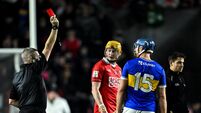Sky-high profits didn’t prevent low tactics
AER LINGUS was on its way to making record profits of over €100 million when the plan to push unwanted employees out the door was drawn up.
The semi-State company made operating profits of €83m in 2003, and €107m up 29% for last year.












